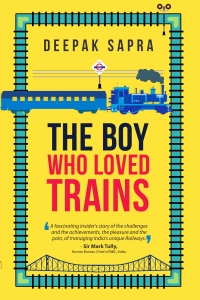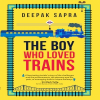
As a young officer posted in India’s Eastern Railway, Jeet Arora is responsible for running trains on one of the densest train routes in the country.
In doing so, he encounters pretty girls and thugs, shares space with buffaloes and goats and finds himself in the midst of oil spills and fires.
As he stumbles across several unexpected. Hilarious and entertaining adventures, can he keep trains and his sanity, on track?
Reproduced below is Chapter 2 of the book, Braving a Riot.
10th December, 1992: Calcutta
‘Get in, Sir. Quickly,’ said the driver of the army truck to my father. ‘The situation in the city is very tense. I will drive through the main road so that there is police around,’ the driver said.
‘Yes, whatever is the safest,’ my father concurred. My father and I got inside the truck that would take us from our house in Belvedere E state in south Calcutta to the Howrah Station, about 10 kilometres away. My father had obtained a special curfew permit and had organized the army truck to take us to the station.
The Babri Masjid in Ayodhya, a 400-year-old mosque, had been demolished four days ago. The politics over the birthplace of the Hindu God Rama, and the subsequent demolition of the mosque had led to a wave of communal violence all over India. Riots had broken out in many parts of the country and lawlessness reigned. There was fear. There was hatred. There was chaos. Most parts of Calcutta were under curfew. Wherever there wasn’t a curfew, there were statutory orders prohibiting assembly of more than five people in a public place.
The Shaktiman army truck we were in, zoomed past the empty streets of Calcutta, going through Red Road, taking a left turn towards E den Garden, then onto Strand Road.
In about 15 minutes from the time we started, we were driving into Howrah Station. This journey on regular days would take an hour. I had never seen Calcutta as deserted, noiseless and desolate as it was today.
‘Jai Hind,’ said the driver as we got off the army truck on the road between Platforms 8 and 9 on Howrah Station. ‘Jai Hind,’ said my father.
We took our appointed berths in the S-8 coach in the 1 Up, Howrah-Kalka Mail. While on most days the Kalka Mail is choc-a-bloc, today there was just one more person in our coach, making us three in all.
‘Everyone move to coach S-4 so that all can travel safely,’ announced the ticket examiner. He got all the passengers on the train, about 25 people, into a single coach so that there would be safety in numbers.
‘Please keep the windows closed at all times,’ he advised.
This instruction was to prevent exposing passengers to rioting zealots. In the last few days all over India, there has been too many of them. People who had gone berserk as an outcome of a frenzied communal outbreak. Trains being a soft target, there was a good chance of them being targeted at railway stations.
I was scared. I told my father, ‘What is the pressing need for us to take this risk? Is it worthwhile? Heavens are not going to fall if we don’t go.’
The pressing need for passing through a curfew and a near war zone was that two days later, on the morning of the 12th of December, was my interview at the UPSC, the Union Public Service Commission in Delhi, for the Special Class Railway Apprentices exam, also called SCRA. This SCRA program offered school-leaving students a bachelor’s degree in mechanical engineering, followed by commissioning into the Indian Railways Service. Since almost a hundred thousand people took the exam and about ten were selected, the odds were heavily stacked against anyone who was taking it.
‘Listen, son. You have already cleared the first step, that of the written exam, which has eliminated the majority of the crowd and has left a few hundred in the fray,’ my father said. ‘Attend the interview and give it your best,’ he added.
A long time ago, almost 32 years to the day, my father too, had taken the interview for this examination. Unsuccessfully. Now here he was, accompanying me through a curfew zone, perhaps living his dream through me.
Right from my childhood, he had instilled in me a great sense of wonder for trains. When I was a threeyear- old, he had gifted me a working model of an Italian train set called Lima, purchased on his first visit abroad.
It was this same love for trains which was manifesting itself again. Making us risk it all by taking a journey across the heartland of a country rioting, and in flames.
Our apprehensions were many; fortunately, the journey was uneventful. The train passed through deserted stations and in 24 hours from the time we left Calcutta, the train rolled into Old Delhi railway station. In this station, the typical sight of touts, auto drivers, urchins, beggars and coolies painted a picture of normalcy and gave us a great sense of relief.
The next day, on the 12th of December, 1992, I was at the UPSC in Delhi, in front of an interview panel. Having made it to Delhi under testing circumstances, just being at the interview venue was a win. A panel of five elderly, serious-looking people were staring at me. ‘So, why do you wish to join the Railways?’ asked the panelist seated in the centre.
‘I love trains. That is why,’ I snapped back.
The person was taken aback by this sharp answer.
‘Prove it,’ he said.
‘Sir, ask me any train’s timing at any station, I can tell you that,’ I said.
‘Hmm. . .ok, tell me the time of Rajdhani Express at Delhi,’ he asked.
‘Sir, it is New Delhi station, not Delhi. And there are two Rajdhani Expresses at New Delhi, one to Bombay Central and one to Howrah. The one to Bombay Central leaves New Delhi at 1630 hours and the one to Howrah leaves New Delhi at 1700 hours.’
The rest of the interview was nondescript. There was a little bit about physics that one of the panelists asked and the remaining questions were largely around my background and interests.
About 20 minutes later, the person seated in the centre said, ‘We are done with our questions.’ He turned to me and said, ‘Do you want to ask anything?’
I nodded. ‘Sir, I want to ask you a question about trains.’
‘Ok,’ he said. ‘Go ahead.’
‘Could you please tell me which station mentioned in the Indian Railways timetable is not located in India?’
The panelists looked at each other sheepishly for a while. There was no answer. ‘May I?’ I asked. ‘Go ahead,’ said the panelist in the centre. ‘It’s Lahore, Sir. The last stop for the Samjhauta Express, the only train link between India and Pakistan,’ I said, tongue in cheek.
He nodded and said, ‘You may leave now.’ ‘Thank you, Sir,’ and I came out to see my father waiting, eager to know what transpired in the interview. I narrated the story of the last 20 minutes to my father. Excitedly.
‘What was the need to ask them a question which might have possibly embarrassed them?’ he admonished me, referring to the Lahore question. ‘You have seen how much trouble we endured just to reach Delhi for the interview. With your extra-smartness, you have probably put paid to your chances of success at the interview.’
I was distraught at his disappointment. I went out of the UPSC office, walked a few hundred metres out of the campus, and found an STD phone booth. I called up my mother and narrated this story. ‘That was very good,’ she said encouragingly. ‘Well done! You have given it your best. Whatever happens will be fine. Now go and eat something.’ This boosted my confidence again. Buoyed, we walked up to a nearby snack vendor, and had samosa and tea. Two months later, I received a letter by registered post, in a brown envelope, which had ‘O.I.G.S.’ printed on it and in the line just below, ‘On India Government Service’.
The letter said that I had been selected as a Special Class Railway Apprentice of the 1992 batch. It also listed the names of nine others, with photographs of each of them. There was only one girl in the list of selected candidates and nine boys.
Along with the letter, was a First Class Pass, essentially a ticket to travel on the train, by first class, for free! On it was written: Shri Jeet Arora, Howrah to Jamalpur. re-checked to confirm whether it would indeed allow travel for free, that too in an AC coach. The letter also stated, in no uncertain terms, ‘You should join the Indian Railways Institute of Mechanical and E lectrical E ngineering at Jamalpur on the 15th of March, 1993, not a day earlier, not a day later.’ When people around us came to know I had been selected for the Railways, questions flooded in. ‘How many years will it take you now to become a ticket checker?’ was one of the most common.
‘We will now not have any problems to get reserved seats,’ was the hope that many espoused. ‘Will you be able to hold high positions like Station Master?’ was another question commonly asked. ‘Are you going to become a driver?’ ‘Will you be a guard?’ ‘After even IIT, he cannot be a ticket examiner. Your son is very lucky. Here, he can be,’ the next door aunty told my mother. It was in the midst of such conversations that most of my days prior to the 15th of March were spent.
You can buy the book on Amazon.
About the Author



Comments